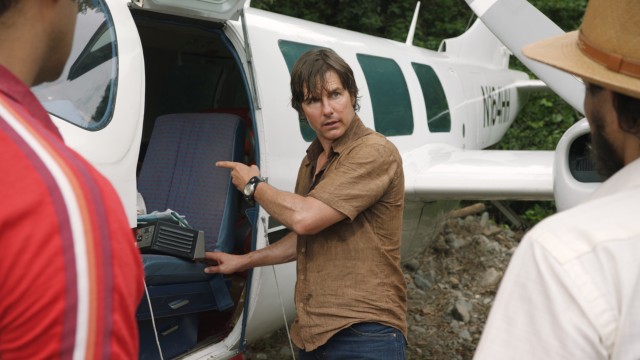American Made Movie Review
 |
American Made
Theatrical Release: September 29, 2017 / Running Time: 115 Minutes / Rating: R Director: Doug Liman / Writer: Gary Spinelli Cast: Tom Cruise (Barry Seal), Domhnall Gleeson (Monty "Schafer"), Sarah Wright Olsen (Lucy Seal), Jesse Plemons (Sheriff Downing), Caleb Landry Jones (JB), Lola Kirke (Judy Downing), Jayma Mays (Dana Sibota), Alejandro Edda (Jorge Ochoa), Benito Martinez (James Rangel), E. Roger Mitchell (Agent Craig McCall), Jed Rees (Louis Finkle), Freddy Yate Escobar (Carlos Lehder), Mauricio Mejia (Pablo Escobar), Robert Farrior (Oliver North), Morgan Hinkleman (Christina), Alberto Ospino (Manuel Noriega), Felipe Bernedette (Translator), Daniel Lugo (Adolfo Calero) |
Brands rule Hollywood today, but one of the business' oldest and most successful brand finds itself in crisis. I'm talking about the Tom Cruise movie. From his early twenties to his early forties, Cruise was one of the most reliable draws around. His films consistently topped nine figures domestically, whether they were a courtroom drama, While Mission continues to flourish (a sixth installment is due in theaters next summer), Cruise hasn't had as much success attaching himself to other existing brands. Jack Reacher fizzled with a sequel of insufficient demand. Meanwhile, this summer's The Mummy, intended not just to reboot a dormant franchise but jump-start a full cinematic universe, grossly underperformed domestically amidst negative reviews. Now, Cruise is back to just testing his own brand out with American Made, a vehicle that reunites him with Doug Liman, director of 2014's well-regarded Edge of Tomorrow (which has been quasi-retitled and is being sequelized).
American is based on a true story, but not a well-known one, which means it's Cruise's star power being put on trial as it was on mid-range performers like Oblivion and Knight & Day. Cruise plays Barry Seal, who at the film's opening in 1978 is a pilot for TWA. He is approached one day by "Schafer" (Domhnall Gleeson), a CIA agent who asks him to take reconnaissance photos of South America. Barry digs the new job and soon quits his pilot job to perform missions for the CIA full time. Before long, Seal is being tapped to deliver guns to Panama where a revolution is being encouraged. In addition, Seal begins to act as a courier for Colombia's infamous Medellνn Cartel, delivering cocaine to wherever Pablo Escobar and company tell him to.
Such work inevitably involves some risk for Seal, who has to keep it hidden from his wife (Sarah Wright) and young children. He has to relocate the family, as he draws interest from a bevy of different law enforcement agencies who humorously all convene on him at the same time. But though at first hard up for cash, Seal becomes preposterously wealthy, with more suitcases full of cash than he can find places to hide.
With period tunes, a sense of humor, and free spirited editing, American Made joins the tradition of crime films like Martin Scorsese's Goodfellas and The Wolf of Wall Street. The fact that Seal is technically working for the good guys while making off like a bandit does not prevent the movie from playing a lot like one of the countless inspired by Goodfellas, from Blow to American Hustle to last winter's scarcely seen Matthew McConaughey vehicle Gold. It's a fun sandbox to play in and Liman, Cruise, and screenwriter Gary Spinelli (who probably wishes this, not the 2012 Dolph Lundgren movie Stash House, was his first credit) all clearly enjoy it. There are clips of the real Reagans, a phone call from Bill Clinton, and a cameo by an actor very convincingly portraying a young George W. Bush.
Judged against the other works in the subgenre, American Made feels pretty middle of the pack. Cruise is his usual charismatic self, inexplicably still defeating Father Time. We barely notice the fighting skills and derring-do of his most recent action films are not at his disposal here. Instead, Seal is just a bold guy willing to brush up against danger. The characterization is not particularly flashy. Some of that may be Cruise just phoning in duties he could handle in his sleep. But mostly Seal just isn't as magnetic a personality McConaughey's Gold hero or Christian Bale's American Hustle lead.
Cruise's supporting cast, which is surprisingly light on star power and clout, gets even less to do. There's Jesse Plemons playing a greasy-fingered southern sheriff in a couple of scenes. Jayma Mays pops up briefly as a state attorney out to nab Seal. Caleb Landry Jones gets to command the screen for a little bit at least. But it's mostly the If the unusually light attendance at my advance screening was any indication, American Made should add further question to Cruise's drawing power in North America, where this opens a couple of weeks after debuting in most other parts of the world. It's slightly better than Cruise's Mummy was, but it will likely to struggle to even get that close to the actor's formerly dependable $100 million domestic mark and without foreign audiences chipping in as much as they did on Mummy. The erosion of Cruise's grosses doesn't demand sympathy for him. He's still got the Mission: Impossible franchise and no doubt greater creative opportunities than his mostly direct-to-video contemporaries like Nicolas Cage and John Cusack get.
|
Related Reviews:
DVDizzy.com | DVD and Blu-ray Reviews | New and Upcoming DVD & Blu-ray Schedule | Upcoming Cover Art | Search This Site
DVDizzy.com Top Stories:
Now in Theaters: Kingsman: The Golden Circle American Assassin Battle of the Sexes
Directed by Doug Liman: Edge of Tomorrow Jumper
Tom Cruise: Vanilla Sky The Mummy Knight & Day Jack Reacher Jack Reacher: Never Go Back Mission: Impossible - Rogue Nation
Gold War Dogs The Wolf of Wall Street Goodfellas American Hustle Scarface Black Mass The Infiltrator Catch Me If You Can
Text copyright 2017 DVDizzy.com. Images copyright 2017 Universal Pictures, Cross Creek Pictures, Imagine Entertainment, Vendian Entertainment, Quadrant Pictures, and Hercules Film Fund.
Unauthorized reproduction prohibited.

